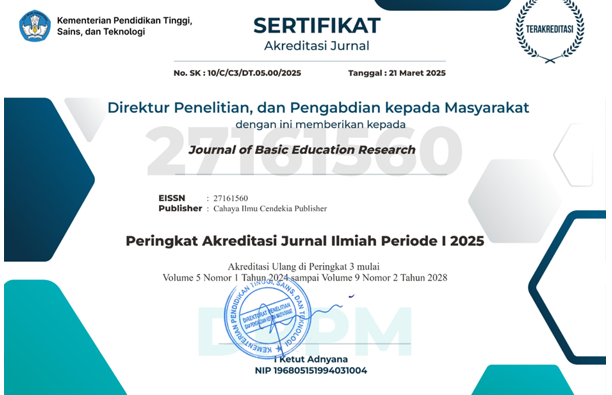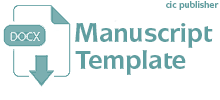Efforts to Improve Class V IPS Learning Outcomes Through the Implementation of the Problem Based Learning Method at State Elementary School
Abstract
Research Objective: To improve students' learning outcomes in social studies. By implementing the Problem Based Learning (PBL) method to help students understand social studies concepts better.
Methodology: This research is a Classroom Action Research (CAR) consisting of four stages of activities, namely: (1) planning stage, (2) action implementation stage, (3) observation stage, and (4) evaluation stage and reflection. The research sample was fifth grade students at SDN 143 Tamiai, with research instruments namely observation, documentation and tests.
Main Findings: The results of the study showed that in the pre-cycle, students' learning completeness reached 27.58%. There was an increase of 20.69% in the implementation of cycle I. In cycle II, there was an increase of 37.93% or learning completeness of 86.20%. Thus, it is proven that the use of the Problem Based Learning learning model can improve students' learning outcomes.
Research Update: This research strengthens the relationship between the Problem Based Learning model and learning outcomes, especially in social studies lessons.
References
R. Khairah, “Penggunaan media maket terhadap keaktifan belajar sejarah materi masa kehidupan pra-aksara siswa,” j. soc. knowl. educ., vol. 1, no. 4, pp. 104–110, 2020, doi: 10.37251/jske.v1i4.369.
I. Y. Rachmawati, H. Van Thang, and M. M. Zwick, “Comparison of cooperative listening team and numbered head together types of learning outcomes of geography in the material of earth’s rotation and revolution,” j. soc. knowl. educ., vol. 4, no. 3, pp. 111–121, 2023, doi: 10.37251/jske.v4i3.702.
M. C. Ambarwati and R. Widodo, “Peningkatan kolaborasi peserta didik melalui model pembelajaran problem-based learning,” j. pendidik. profesi guru, vol. 4, no. 1, pp. 9–16, 2023, doi: 10.22219/jppg.v4i1.25484.
J. R. Park and T. H. Kim, “Effect of box height on the muscle activity during the bulgarian split squat exercise,” int. j. hum. mov. sport. sci., vol. 11, no. 1, pp. 118–123, 2023, doi: 10.13189/saj.2023.110114.
S. Misbah, “Penerapan metode umpan balik (feed back partner) untuk meningkatkan prestasi belajar siswa pada mata pelajaran bahasa indonesia materi struktur dan kebahasaan teks anekdot kelas x ips-2 sman 4 kota bima semester 1 tahun pelajaran 2020/2021,” j. pendidik. dan pembelajaran indones., vol. 2, no. 2, pp. 143–154, 2022, doi:10.53299/jppi.v2i2.219.
H. Baek, M. Cho, S. Kim, H. Hwang, M. Song, and S. Yoo, “Analysis of length of hospital stay using electronic health records: a statistical and data mining approach,” plos one, vol. 13, no. 4, p. e0195901, apr. 2018, doi: 10.1371/journal.pone.0195901.
I. Abdullah, B. Hudayana, P. M. Kutanegara, and A. Indiyanto, “Beyond school reach: character education in three schools in yogyakarta, indonesia,” j. educ. soc. res., vol. 9, no. 3, pp. 145–159, sep. 2019, doi: 10.2478/jesr-2019-0032.
C. Diawati, N. Fadiawati, and K. Herlina, “Teachers’ and students’ perception about creative thinking skills, immersed integrated science learning, and project-based learning: a cow dung waste issue,” j. pendidik. dan pembelajaran kim., vol. 9, no. 2, pp. 108–113, 2020, doi: 10.23960/jpk.v9.i2.202010.
N. Fadila, “Pengembangan modul matematika berbasis accelerated learning pada materi himpunan di smpn 1 kota jambi,” j. eval. educ., vol. 2, no. 3, pp. 107–111, 2021, doi: 10.37251/jee.v2i3.216.
S. Midway, M. Robertson, S. Flinn, and M. Kaller, “Comparing multiple comparisons: practical guidance for choosing the best multiple comparisons test,” peerj, vol. 8, pp. 1–26, 2020, doi: 10.7717/peerj.10387.
E. Fitriani, L. O. S. Arihi, and I. Ashari, “Penerapan model pembelajaran problem based learning untuk meningkatkan hasil belajar siswa pada pembelajaran ips di kelas iv,” J. Ilm. Pembelajaran Sekol. Dasar, vol. 6, no. 1, pp. 68–79, 2024, doi: 10.36709/jipsd.v6i1.53.
S. Sunhaji, “Implementasi strategi cooperative learning dalam membentuk keterampilan berfikir peserta didik,” j. pendidik. agama islam indones., vol. 2, no. 4, pp. 61–64, 2021, doi: 10.37251/jpaii.v2i4.599.
F. Fitriyani, “Persepsi siswa terhadap lembar kegiatan siswa berbasis mind mapping pada mata pelajaran ipa terpadu materi tekanan zat cair,” schrödinger j. phys. educ., vol. 3, no. 1, pp. 10–12, 2022, doi: 10.37251/sjpe.v3i1.485.
R. Bellová, D. Melicherčíková, and P. Tomčík, “Possible reasons for low scientific literacy of slovak students in some natural science subjects,” Res. Sci. Technol. Educ., pp. 1–18, 2017, doi: 10.1080/02635143.2017.1367656.
H. Kurniawan, R. Y. Purwoko, and D. S. Setiana, “Integrating cultural artifacts and tradition from remote regions in developing mathematics lesson plans to enhance mathematical literacy,” J. Pedagog. Res., vol. 8, no. 1, pp. 61–74, 2024, doi: 10.33902/jpr.202423016.
T. P. Astuti, “Model problem based learning dengan mind mapping dalam pembelajaran ipa abad 21,” proceeding biol. educ., vol. 3, no. 1, pp. 64–73, 2019, doi: 10.21009/pbe.3-1.9.
D. Mahrunnisya, “Keterampilan pembelajar di abad ke-21,” jupenji j. pendidik. jompa indones., vol. 2, no. 1, pp. 101–109, 2023, doi: 10.57218/jupenji.vol2.iss1.598.
Z. Fajri, H. Baharun, C. Muali, Shofiatun, L. Farida, and Y. Wahyuningtiyas, “Student’s learning motivation and interest; the effectiveness of online learning during covid-19 pandemic,” J. Phys. Conf. Ser., vol. 1899, no. 1, 2021, doi: 10.1088/1742-6596/1899/1/012178.
D. Kumalasari, H. Purwanta, and S. Aw, “Comparative analysis of generation z’s digital history literacy in history education majors on java island: a study of history digital literacy,” J. Educ. E-Learning res., vol. 11, no. 1, pp. 90–96, 2024, doi: 10.20448/jeelr.v11i1.5342.
T. F. Kristiana And E. H. Radia, “Meta analisis penerapan model problem based learning dalam meningkatkan hasil belajar ipa siswa sekolah dasar,” J. Basicedu, vol. 5, no. 2, pp. 818–826, 2021, doi: 10.31004/basicedu.v5i2.828.
Kamid, R. K. Dewi, D. A. Kurniawan, M. Z. Azzahra, and A. M. Nawahdani, “student learning difficulties in terms of the stif in framework of fractional material,” j. penelit. dan pengemb. pendidik., vol. 7, no. 2, pp. 187–194, 2023, doi: 10.23887/jppp.v7i2.57371.
S. H. Lin And Y. C. Huang, “examining charisma in relation to students’ interest in learning,” act. learn. high. educ., vol. 17, no. 2, pp. 139–151, 2016, doi: 10.1177/1469787416637481.
E. W. Simamora, “the effect of student team achievement division cooperative learning on the concept understanding ability of mathematic,” vol. 104, no. 22, pp. 407–411, 2017, doi: 10.2991/aisteel-17.2017.87.
Y. Kuswardi, F. Nurhasanah, B. Usodo, H. Ekana, S. Sutopo, And M. Shahrill, “a learning trajectory for statistics through the traditional game of congklak to enhance mathematical reasoning skills,” int. j. pedagog. teach. educ., vol. 8, no. 1, p. 111, 2024, doi: 10.20961/ijpte.v8i1.90547.
A. Dengel, M. Z. Iqbal, S. Grafe, And E. Mangina, “a review on augmented reality authoring toolkits for education,” front. virtual real., vol. 3, no. april, pp. 1–15, 2022, doi: 10.3389/frvir.2022.798032.
D. Angraini, “kegiatan ekstrakurikuler pramuka dalam menerapkan karakter tanggung jawab di sekolah dasar,” indones. j. educ. res., vol. 2, no. 1, pp. 1–6, 2021, doi: 10.37251/ijoer.v2i1.515.
N. Yunita and T. Nurita, “analisis keterampilan proses sains siswa pada pembelajaran daring,” pensa e-jurnal pendidik. sains, vol. 9, no. 3, pp. 378–385, 2021.
R. Sudrajat, “Pemanfaatan media ict pembelajaran pendidikan pancasila dan kewarganegaraan untuk meningkatkan kompetensi kewarganegaraan di sma 2 meranggen,” civis, vol. ix, no. 1, pp. 40–60, 2020, [online]. available: http://journal.upgris.ac.id/index.php/civis/article/viewfile/6082/3169
R. N. Oktaviani, “implementasi model pembelajaran problem based learning (pbl) berbasis lesson study untuk meningkatkan keterampilan komunikasi dan kolaborasi mahasiswa pada mata kuliah perencanaan pembelajaran di SD,” ELSE (Elementary Sch. Educ. Journal) J. Pendidik. dan Pembelajaran Sekol. Dasar, vol. 6, no. 2, p. 257, 2022, doi: 10.30651/else.v6i2.11095.
F. Alatas and L. Fauziah, “Model problem based learning untuk meningkatkan kemampuan literasi sains pada konsep pemanasan global,” JIPVA (Jurnal Pendidik. IPA Veteran), vol. 4, no. 2, p. 102, 2020, doi: 10.31331/jipva.v4i2.862.
I. Hidayanti and F. Wulandari, “The effect of problem-based learning based ethnoscience on science literacy ability of elementary school,” Edunesia J. Ilm. Pendidik., vol. 4, no. 3, pp. 967–982, 2023, doi: 10.51276/edu.v4i3.475.
A. Jalil, “Karakter pendidikan untuk membentuk pendidikan karakter,” Nadwa J. Pendidik. Islam, vol. 6, no. 2, pp. 175–194, 2016, doi: 10.21580/nw.2012.6.2.586.
R. Zainul, B. Oktavia, and A. putra, “Pengenalan dan pengembangan e-modul bagi guru- guru anggota mgmp kimia dan biologi kota padang panjang,” 2018, doi: 10.31227/osf.io/yhau2.
Copyright (c) 2025 Suharti Suharti, Nuzul Rahmadani

This work is licensed under a Creative Commons Attribution 4.0 International License.
Authors who publish with this journal agree to the following terms:
- Authors retain copyright and acknowledge that the Journal of Basic Education Research is the first publisher licensed under a Creative Commons Attribution 4.0 International License.
- Authors are able to enter into separate, additional contractual arrangements for the non-exclusive distribution of the journal's published version of the work (e.g., post it to an institutional repository or publish it in a book), with an acknowledgment of its initial publication in this journal.
- Authors are permitted and encouraged to post their work online (e.g., in institutional repositories or on their website) prior to and during the submission process, as it can lead to productive exchanges and earlier and greater citation of published work.





.png)


.png)
.png)


















